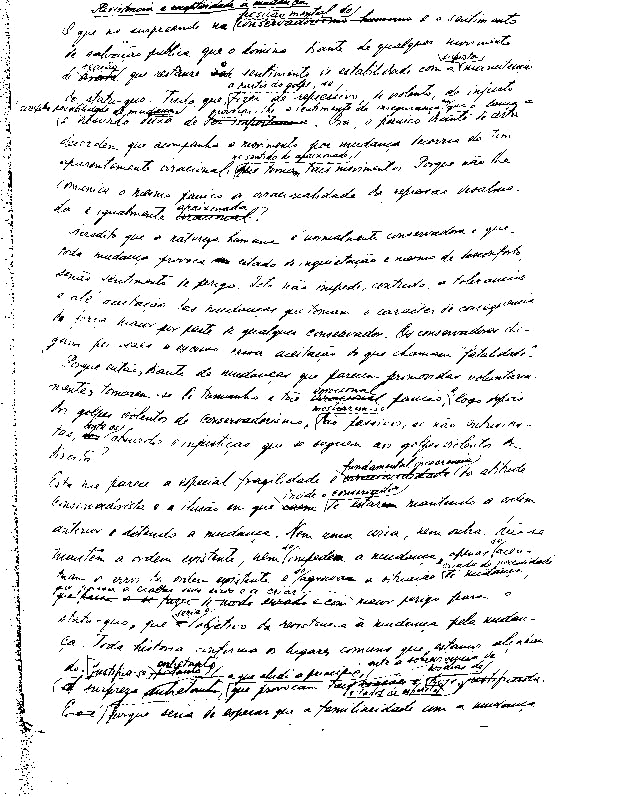

NOTE : On March 14, 1971, Anísio Teixeira was found dead under circumstances which are still not very clear up to this date. In the briefcase he was carrying with him when he disappeared three days before his passing away, and which lay beside his body, the following manuscript was found, probably the last text he wrote...
About Resisting and Accepting Change
What surprises me most about the mindset of the followers of Conservatism is the feeling of public relief which dominates them in the presence of any movement of political reaction restoring their conception of stability, meaning the probable maintenance of the status quo. Any repressive, violent, unfair and absurd action undertaken in the aftermath of the military coup, lacks to produce in them the feeling of uncertainty called forward by the mere possibility of change. The terrible fear caused by a certain disorder which comes along with movements in favor of change must be due to the apparently irrational and passionate nature which such movements tend to adopt. Why don't they feel the same panic and lack of rational reasoning with regard to repression, which is equally cruel and passionate ?
I believe that human nature is naturally conservative and that any cahnge produces a sense of restlessness and discomfort, if not of danger. This, however, does not seem to hinder the tolerance and acceptance of changes which are considered by the Conservatives as a result of actions of God. Conservatives sometimes exaggerate in their acceptance of what the call "fatal".
When then, in the presence of changes which seem to result from voluntary social movements are they seized by such tremendous fear and emotional upheaval, whereas shortly afterwards, after the violence impelled by the conservative forces they turn into passive, if not enthusiastic onlookers of the absurd and unfair acts of violence committed by the right.
This seems to me the weakest and most incoherence trait of the conservative attitude, along with the illusion they cherish with regard to the maintenance of the former state of things, thus preventing change from taking place. In fact, it is neither one thing nor the other we are facing here; neither is the existing order maintained nor is change prevented from happening. Moreover, the situation reduces itself to allowing the previous order getting worse and worse, thus creating a situation calling for change, errors and mistakes being praised and endangering even more the status quo, which becomes the goal of resistance to change for change's sake. What is said here is just commonplace and can be observed along History. I am still surprised, however, as I already mentioned earlier, at the survival of a mindset which produces such reactions until our days. Why were we to expect that familiarity with change should be commonly accepted by human nature ? In fact, all reasoning of mankind is permeated by the thought of change. The very essence of scientific methodology is the absence of predefined judgement. All we do is based on assumptions, obviously subject to change, change deriving from new information, and new information deriving from new experiences, and these new experiences, in their turn, arising from the permanent flow of change underlying human life itself, as we conceive it today. Having this in mind, the general attitude cannot be but to welcome change. Change is an opportunity for new experience and an opportunity for acquiring more knowledge. The essential thing is to accept change and to submit it to an ever critical appraisal so that the outcome of change be a new order and a new progress. The distich in our national flag does not refer to a preestablished order and progress, but just to order and progress as something inherent to human life itself. There is nothing in human life which can abdicate of these principles, which are the principles of life itself in all its aspects. Natural sciences wholly take this for granted. Why then, should some people believe that in social sciences the process of change can be brought to a halt ? Change, as it is, does not fatally happen, but stems from the free will, from the wish and the efforts of Man, who has ultimately created existence in its previous phases. It is quite clear that anything else is totally absurd, all the more so since Man became aware of the transient flow of his own life.The irrational and emotional resistance to change is a remnant of a certain static thinking which prevailed some two thousand five hundred years ago and was subject to fierce change some five hundred years ago, along with the development of the natural sciences. This leaves us to consider how surprising it is that a wholly outdated way of thinking should prevail in the minds of such a great many people up our days.